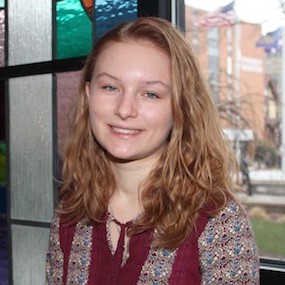Adverse Childhood Experiences Study Discussed

F. Dennis Dawgert, M.D., explained that an important study shows Adverse Childhood Experiences (ACEs) are the root of many seemingly unrelated issues that children with such negative experiences may face later in life. The talk, “ACE Study and Resiliency,” was presented at a Schemel Forum collaborative program with Geisinger Commonwealth School of Medicine earlier this month on campus. Dr. Dawgert, a former pediatrician, teaches at Geisinger Commonwealth School of Medicine.
Types of ACEs include verbal, physical and emotional abuse, neglect, witnessing of a parent’s abuse by another, or separation from a parent. ACEs are common, but the more ACEs are sustained, the more a child’s risk of future diseases or negative health events increase. These diseases and health issues include mental illness, addictions, severe obesity, high number of sex partners, stroke, hepatitis, ischemic heart disease and more. Children with ACEs are also less likely to graduate high school and college.
For Dr. Dawgert, understanding ACEs and preventative medicine go hand in hand. According to a large study by the CDC and Kaiser-Permanente on people who had experienced ACEs, those negatively impacted children grow into adults who are much more likely to suffer from disease, commit crimes, and even die decades earlier than their peers. People on death row, Dr. Dawgert pointed out, have very high ACE scores.
In society today, “we have many institutes that look at smoking, look at obesity, look at type 2 diabetes, look at cancers and other diseases, look at suicide,” Dr. Dawgert said. “And yet, we haven’t made the trip back upstream to figure out where this all comes from.”
The reason ACEs cause so much pain even after they have been inflicted lies in neurology. The brain can deal with different levels of stress, Dr. Dawgert said. Yet if sustained stress is severe enough or inflicted chronically while a child’s brain is still forming, the severe stressors can change how the brain forms, impacting a child’s thoughts and behaviors for the rest of their lives.
However, all is not lost for children with ACEs. Preventing ACEs from occurring, or treating them earlier on, could significantly improve the lives of children by helping their brains heal from psychological trauma earlier on, thus avoiding a slew of future health problems. The study of ACEs, Dr. Dawgert emphasized, extends into not just the topic of public health but also legal and educational issues across the globe, and should inform our consideration of current events such as the child separations at the U.S. Mexico border.
“We have to become aware of it and what the effects of adverse childhood experiences are so that we can look at this not as a medical problem, or social work problem, or psychiatric problem,” Dr. Dawgert said, viewing ACEs as a community responsibility, and a problem to solve together.
“There are things that can happen that help people who have ACEs,” Dr. Dawgert said. Doctors have found that children who can employ resilient mindsets can undo some of the negative effects of ACEs, and increase their life expectancy as well as decrease their risk of disease.
Supportive family, peers, teachers and coaches can all contribute to a child’s development of a healthy sense of self, and teach healthy behaviors.
“Resiliency is … positive adaptation, despite adversities,” Dr. Dawgert said. He showed the audience a picture of flowers pushing up through a crack in a road, blooming. “If you have some sort of supportive person, or supportive factor in your life,” it can make all the difference. “I can’t say you can get rid of ACEs, but you can obviate them to some extent.”
For more information on the Schemel Forum, please contact Sondra Myers, director of the Schemel Forum, at 570-941-4089, or at Sondra.myers@scranton.edu.







